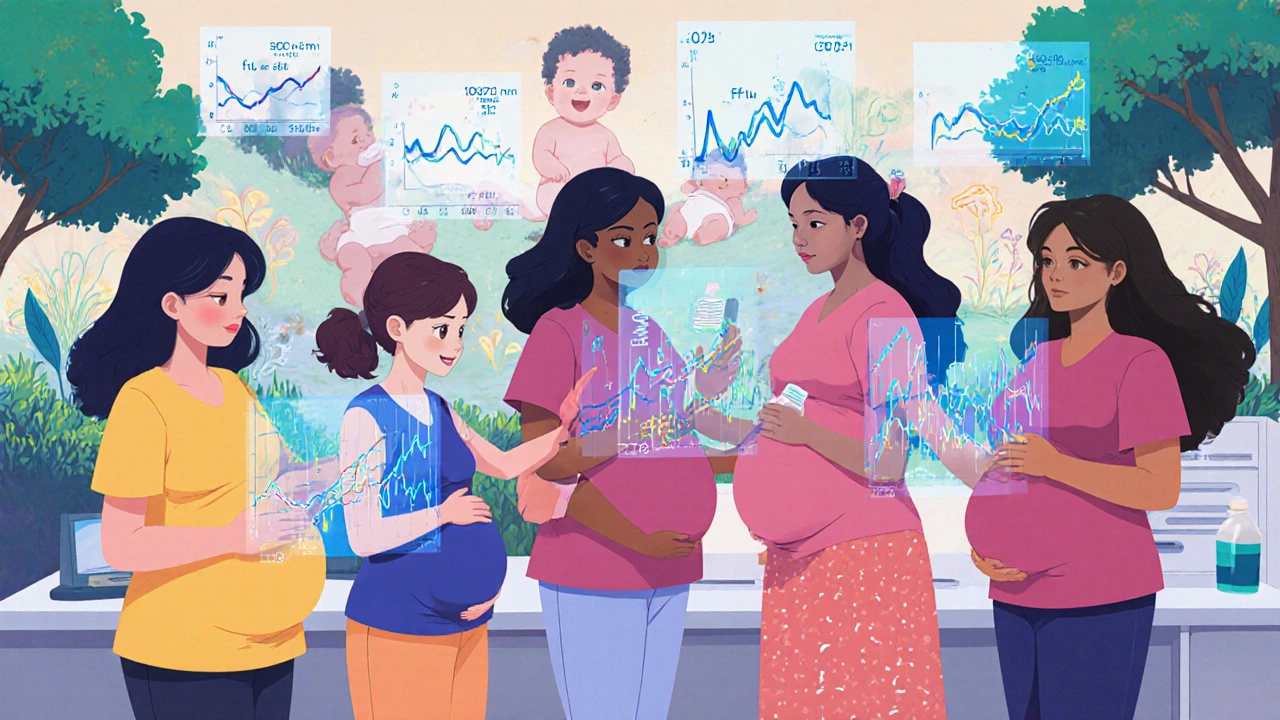When you're pregnant, every decision feels bigger. A cold isn't just a cold-it could mean a hospital visit. A cough isn't just annoying-it might put your baby at risk. That’s why vaccines during pregnancy aren’t optional. They’re one of the most powerful tools you have to protect both yourself and your newborn. The science is clear, the safety data is strong, and the timing matters more than you might think.
Which vaccines are safe during pregnancy?
Not all vaccines are created equal when you’re expecting. The ones recommended during pregnancy are carefully chosen based on decades of research and real-world use. You can safely get inactivated vaccines and mRNA vaccines-these don’t contain live viruses and can’t cause the disease they’re meant to prevent.
The Tdap vaccine (tetanus, diphtheria, and acellular pertussis) is given between 27 and 36 weeks of pregnancy, ideally around 27-30 weeks. Why then? That’s when your body produces the highest levels of antibodies, and they have the best chance to cross the placenta. Babies under 2 months old can’t get their own pertussis shots yet-and pertussis (whooping cough) can be deadly for them. Studies show babies whose moms got Tdap during pregnancy have 37% fewer hospitalizations from whooping cough.
The influenza vaccine is safe in any trimester, but it’s best to get it as soon as it’s available each year-usually in July or August. Flu season runs from October to May, and pregnant people are at higher risk for severe illness. During the 2020-21 flu season, nearly half of pregnant people in England got the shot. For those who did, their babies had 41-63% less chance of catching the flu in their first few months.
The mRNA COVID-19 vaccines (Pfizer-BioNTech and Moderna) are also safe and strongly recommended. Between May and October 2021, 96% of pregnant people hospitalized with severe COVID-19 were unvaccinated. The vaccines cut the risk of infection by nearly 90% and reduced hospitalization risk by over 96%. They’re updated yearly to match circulating strains, so get the latest version when it’s available.
The newest addition is the RSV vaccine (Abrysvo). Approved in May 2023 and recommended between 32 and 36 weeks, it protects your baby from severe respiratory syncytial virus. RSV causes up to 80% of bronchiolitis cases in babies under 1 year. The MATISSE trial showed the vaccine reduces hospitalizations from RSV by 81.8% in the first 90 days after birth.
What vaccines should you avoid during pregnancy?
Live vaccines-those that use weakened forms of the virus-are not recommended during pregnancy. These include the nasal spray flu vaccine (LAIV), MMR (measles, mumps, rubella), and varicella (chickenpox). The risk isn’t proven, but it’s theoretical-and we don’t take chances with developing babies.
If you need any of these vaccines, get them at least 28 days before you try to conceive. That gives your body time to build immunity without exposing the fetus. If you find out you’re pregnant and recently got one of these, talk to your provider. Most cases have no negative outcomes, but monitoring is still important.
How do vaccines protect your baby after birth?
It’s not just about keeping you healthy. It’s about giving your baby a head start. When you get vaccinated during pregnancy, your body makes antibodies. These travel through the placenta and give your baby passive immunity-like a temporary shield.
For pertussis, babies born to vaccinated moms have antibody levels 1.4 times higher in their cord blood than their mothers’. That’s powerful protection in those first fragile weeks. For flu, babies get 60-70% protection from infection in the first 6 months. And for RSV, the protection lasts through the first 6 months of life.
But here’s the catch: this protection fades. Pertussis antibodies drop below protective levels by 2 months. Flu antibodies fade by 2-3 months. That’s why your baby needs their own vaccines on schedule-at 2, 4, and 6 months. Maternal vaccines buy time. They don’t replace the infant series.

Are vaccines safe for you and your baby?
Over 1.5 million pregnant people in the U.S. have received the flu shot since 2010. More than 1.2 million have gotten Tdap. The CDC’s Vaccine Safety Datalink tracked 39,055 pregnancies after Tdap and found no safety concerns. The v-safe pregnancy registry followed nearly 140,000 people who got COVID-19 vaccines during pregnancy-84.6% had no complications.
Side effects? Mostly mild. About 70% report soreness at the injection site. A few feel tired or have a low-grade fever for a day. Less than 1 in 10,000 doses leads to a reportable adverse event. That’s lower than the risk of getting the disease itself.
One of the biggest fears? Ingredients. Thimerosal (a preservative) is in some flu shots, but it’s not in the single-dose versions most providers use. Aluminum is in Tdap, but in tiny, safe amounts-less than what’s in breast milk or formula. mRNA vaccines don’t contain any preservatives or live virus. They just give your cells instructions to make a harmless piece of the virus so your immune system learns to fight it.
When should you get each vaccine?
Timing isn’t just a suggestion-it’s science.
- Influenza: Get it as soon as it’s available, ideally by October. Protection lasts through peak flu season.
- Tdap: Between 27 and 36 weeks. Best at 27-30 weeks. Earlier than 20 weeks? You lose nearly 40% of the antibody transfer.
- COVID-19: Get the latest updated dose whenever it’s available. No need to wait-get it even if you’ve had it before.
- RSV (Abrysvo): Between 32 and 36 weeks, and only during September through January. Outside that window, protection won’t align with peak RSV season.
Don’t wait until your last prenatal visit. Schedule your vaccines early in the recommended window. Providers are now required to document vaccination counseling in your prenatal record-and 93.8% of them now recommend vaccines routinely.

What if you’re breastfeeding?
Everything you got during pregnancy? You can get it again after birth. Breastfeeding doesn’t interfere with vaccines, and vaccines don’t harm your milk. In fact, some antibodies from vaccines show up in breast milk, giving your baby a little extra protection.
Live vaccines like MMR and varicella are safe while breastfeeding. The virus doesn’t pass through milk. You can get them right after delivery if you missed them before.
And if you didn’t get Tdap or the flu shot during pregnancy? Get them right after birth. You’ll protect yourself-and reduce the chance you’ll pass the infection to your newborn.
Why isn’t everyone getting these vaccines?
Despite the evidence, uptake still lags. In 2022, only 60% of pregnant people in the U.S. got Tdap. Only 59% got the flu shot. That’s better than 2012 (14% and 28%), but still too low.
Why? Fear. Misinformation. Confusion. A Reddit thread with over 1,200 comments found that 12% of pregnant people hesitated because of concerns about ingredients. A March of Dimes survey showed 41% of hesitant moms worried about effects on the baby.
But here’s what the data says: the risks of skipping vaccines are far greater than any theoretical risk of the shot. A baby hospitalized with whooping cough? That’s real. A baby in the NICU with RSV? That’s real. A mother with severe flu needing oxygen? That’s real.
Providers are now trained to talk about this clearly. Ask questions. Ask for the data. Ask for the studies. You’re not being difficult-you’re being informed.
What’s coming next?
The future of pregnancy vaccines is bright. A new Group B Streptococcus (GBS) vaccine candidate, GBS6, is in Phase III trials. GBS causes deadly infections in newborns-1 in 2,000 babies gets it. If this vaccine works, it could cut that number dramatically.
Scientists are also working on a universal flu vaccine that protects against all strains, not just the few predicted each year. Early results show 85% effectiveness in trials-much higher than today’s 40-60%.
Global efforts aim to get 70% of pregnant people vaccinated by 2030. Right now, high-income countries hit 45-60%. Low-income countries? Just 15-25%. Every dollar spent on maternal Tdap saves $2.70 in hospital costs for babies.
This isn’t just about one shot. It’s about building a healthier start for every child.
Is it safe to get the flu shot while pregnant?
Yes. The inactivated flu shot is safe in any trimester and is strongly recommended. It reduces your risk of severe illness and protects your baby from flu for the first few months after birth. Over 1.5 million pregnant people have received it safely since 2010.
Can the Tdap vaccine cause whooping cough in my baby?
No. Tdap is an inactivated vaccine-it contains no live bacteria. It cannot cause whooping cough in you or your baby. It only helps your body make antibodies that protect your newborn during their most vulnerable weeks.
What if I got the Tdap vaccine in a previous pregnancy? Do I need it again?
Yes. Antibodies from a previous pregnancy don’t carry over. Each pregnancy needs its own dose to ensure high antibody levels are passed to your current baby. The CDC recommends Tdap during every pregnancy, regardless of past history.
Can I get the RSV vaccine and Tdap at the same time?
Yes. The RSV vaccine (Abrysvo) and Tdap can be given together during the same visit, as long as it’s between 32 and 36 weeks. There’s no increased risk of side effects when they’re given together.
Do I need to wait after getting a vaccine before trying to conceive?
Only if you received a live vaccine like MMR or varicella. For those, wait 28 days. All other recommended pregnancy vaccines-inactivated or mRNA-are safe to receive right up until conception. You don’t need to delay pregnancy after getting flu, Tdap, or COVID-19 vaccines.
What if I didn’t get vaccinated during pregnancy? Is it too late?
It’s not too late. Get the vaccines right after delivery. You’ll protect yourself from spreading illness to your newborn. Breastfeeding also helps pass some antibodies. But remember-your baby still needs their own vaccines on schedule. Maternal vaccination is the best shield, but postpartum vaccination is still valuable.


Andrew Forthmuller
November 12, 2025 AT 05:36just got my flu shot last week and honestly felt fine. no fever, no weirdness. my doc said if i waited till i was 30 weeks for tdap, i’d get better protection. so now i’m just waiting. why do people act like vaccines are some kind of magic poison?
vanessa k
November 12, 2025 AT 13:54i was terrified of vaccines during my first pregnancy. heard so many horror stories online. but after reading the actual studies and talking to my midwife, i got both the flu and tdap. my son is now 8 months old and has never been sick. i wish i’d known sooner how safe it really is. this post saved me from panic.
manish kumar
November 14, 2025 AT 00:06as someone from india where maternal vaccination rates are still shockingly low, i want to say this post is a godsend. in my village, people still believe vaccines cause infertility or autism. i showed this to my sister-in-law who’s 24 weeks along and she’s now booked her rsv and tdap shots. the data here is clear: it’s not about fear, it’s about science. every dollar spent on maternal vaccines saves lives and money. in low-resource settings, this isn’t luxury-it’s survival. we need more public health campaigns like this, translated into local languages. no more myths, just facts.
Nicole M
November 14, 2025 AT 07:50so if i got tdap in my last pregnancy, why do i need it again? i thought the antibodies carried over? just asking because my ob said i need it again and i’m confused.
Arpita Shukla
November 14, 2025 AT 14:37you’re wrong about the rsv vaccine timing. it’s only effective if given between 32 and 36 weeks, but if you’re due in january, you need it in november to cover the season. the article says september to january, which is correct-but most providers don’t explain that the window is narrow because of peak rsv timing. also, tdap should be done at 27 weeks, not 30. 27 is optimal. you lose 40% if you wait till 32. and yes, the aluminum is safe-it’s less than what’s in a banana. stop listening to instagram moms.
Benjamin Stöffler
November 16, 2025 AT 07:42Let’s be clear: the fear isn’t irrational-it’s a biological instinct. We are wired to protect our young. But when that instinct is hijacked by misinformation masquerading as wisdom, we end up with preventable tragedies. The science isn’t perfect-but it’s the best tool we have. And if you’re hesitating because of thimerosal? You’re fighting ghosts. Single-dose flu shots? No mercury. mRNA? No live virus. Aluminum? Less than breast milk. The real danger isn’t the needle-it’s the silence of the scared. Don’t let fear be your doctor.
Mark Rutkowski
November 17, 2025 AT 20:57There’s something sacred about giving your baby a shield before they’re even born. It’s not just medicine-it’s love made tangible. Every antibody you pass through the placenta is a whisper from your body saying, ‘I’ve got you.’ And when your newborn cries in the NICU with RSV, or wheezes from whooping cough, you don’t get to replay that moment. You only get one shot-literally-to protect them. So get the shot. Not because you’re told to, but because you’re a parent. And that’s the most powerful reason of all.
Ryan Everhart
November 18, 2025 AT 18:23so you’re telling me i can get the rsv and tdap together? wow. guess i’ll just roll up my sleeve and let the magic fairy dust do its thing. /s
but seriously, thanks for the data. i didn’t know the rsv window was so tight. i almost missed it.
David Barry
November 19, 2025 AT 04:4160% uptake for tdap? That’s pathetic. In a country with this much medical infrastructure, we’re still leaving 40% of newborns exposed to whooping cough like it’s 1945. Meanwhile, anti-vaxxers post memes about ‘toxins’ while their kids are in the ICU. This isn’t a debate. It’s a public health failure dressed up as personal freedom. Fix the system, not the blame.